In Bloodroot, Betsy Warland traces how a mother and daughter’s shared gender can shape the very anatomy of narrative itself. In her mother’s final year, Warland quietly discovered how to disentangle a crucial, concealed story that had rendered their relationship disconnected and fraught. Warland weaves a common ground that moves beyond duty and despair, providing both questions and guideposts for readers, particularly those faced with ageing and ill parents and their loss.
The 2000 edition of Bloodroot broke new ground in memoir form and uncharted storytelling. The 2021 edition, reprinted by Inanna for the launch of its Inanna Signature Feminist Publications series, includes a new foreword by Susan Olding and a new essay by Warland that explores subsequent questions, insights and tenderness only the passage of time can enable.
“The first time I read Bloodroot, I was astounded. The book’s daring form, ground-breaking at the time, corresponded with the nonlinearity of grief and the fragmented nature of memory and gave a generation of young writers permission to tell their stories in the way they demanded to be told. Twenty-one years later, the beauty and lucidity of Warland’s prose, the artistry in her storytelling, and the boldness of her voice continue to resonate. This book is still astonishing, still heart-opening, and more necessary than ever.”
—Ayelet Tsabari, author of The Art of Leaving
“Bloodroot is a deeply moving and evocative memoir, a reminder that death is not a finite moment, but an unsteady process of holding on and letting go. Read the text. Read the white space. Read the silences in between. Every page is marked by Betsy Warland’s presence and precision.”
—Chantal Gibson, author of How She Read
“What makes Bloodroot a precious reading is the path it follows from facts to memory and fragments of oneself, to thoughts creating and assembling enough proofs to ‘untell a (her) mother’ and compose a viable relation to the truth.”
—Nicole Brossard, poet, novelist and essayist, author of Mauve Desert
“Reading Bloodroot, a thrilling accomplishment of craft, intellect and intuition, I relived my own process of motherlessness. And Warland’s narrative of motherloss is a process, though not linear, of storytelling. Bloodroot’s narrative offers us its own companionship, its own collusion with us as our mothers die.”
—Myrna Kostash, based in Edmonton, author of Ghosts That Walk the Parkland
“Betsy Warland’s Bloodroot is a classic in motherloss memoir that reaches every reader where she is in that life-long journey of learning to accept death as part of our lives. Generations have profited from this complex, brilliant, and insightful book. And now with the new edition, Warland offers more—it reunites the original work with its roots.”
—Carolyn Gammon
“Every word in this book is stretched to capacity, gently unpacking the truth about all the unmet needs that often sit between mothers and daughters. Offered with such tenderness, and careful pacing, the white space invites us to breathe between revelations as we birth new ways, more compassionate ways, to see one another. This is, as Betsy says, a narrative about abandoning disappointment; acquiescing to grace.”
—Jónína Kirton, Métis/Icelandic poet
“Like many readers of Bloodroot 20 years ago, I swayed mightily in Betsy Warland’s sensational e/motional capacity to space and pace this intimate daughter-writer narrative of mourning that both says and unsays. I feel anew profoundly accompanied by Warland’s embodied probing of the contradictions and excisions that narrative performs. Warland’s brilliance as an innovator of creative nonfiction unfolds throughout Bloodroot and the fascinating, generous essay that accompanies this new edition.”
—Margaret Christakos

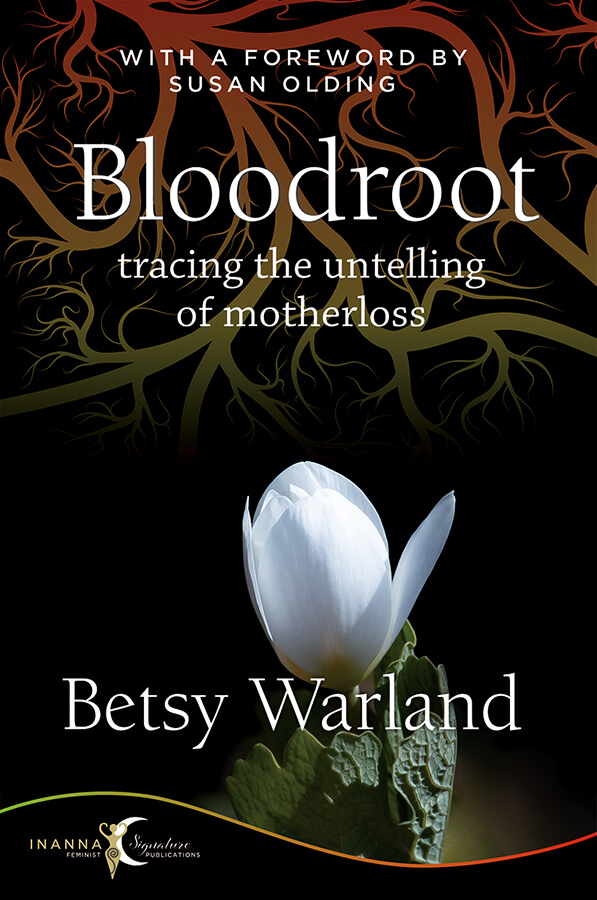

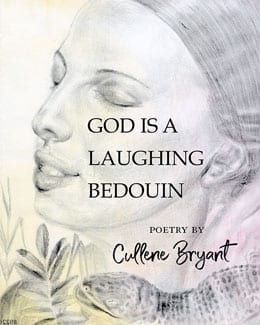

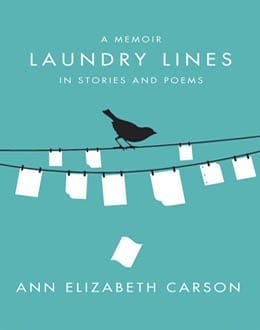
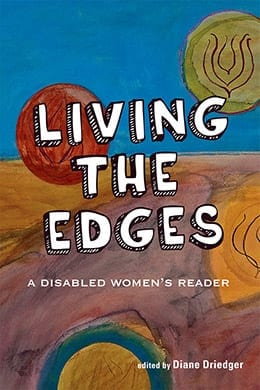
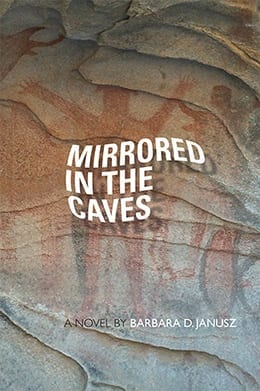
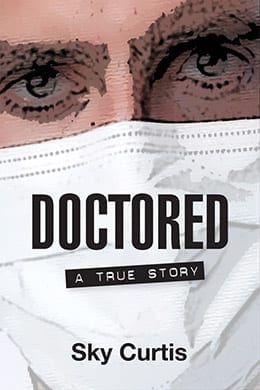
Inanna Admin –
1213 Sex and death in God’s closet
Bloodroot: Tracing the Untelling of Motherloss by Betsy Warland
reviewed by Linda Rogers
The Ormsby Review – August 28, 2021
https://ormsbyreview.com/2021/08/28/1213-rogers-warland-motherloss/
In this time of global suffering and intolerable waiting, there is private room, a virtual closet, for introspection, undressing and redressing. That is the reason to reprint and recelebrate the acquired wisdom of Betsy Warland, who, as a writer and shapechanger, understands transformation inside out and outside in. The death of her mother, an exchange of earthly garments, is her opportunity to examine the meaning of life and this she does with extreme simplicity and ultimate complexity.
Warland’s grief is complicated by issues that rise from the ambiguity of daughterhood. Her mother was a woman of the fifties, her soul bound up in the narrow parameters of girdle and white gloves. Freedom for these women, who lived their best lives in public, bolstered in many cases by mother’s little helpers, the pills that remediated depression, the flip side of rage, could be defined by her decision to bake a cake while her husband was dying. They were the mothers of passive aggression, every nerve ending firing the subsequent knitting of pussy hats.
What a tiny rebellion Mildred aka Billie aka Buddy manifested when she could have been the mother who supported a son and daughter struggling with sexual identity. To the end, she bifurcated her poet daughter into good girl and bad girl, the one who borrowed her playbook and slept with a man and the one who defied religious prescription and slept with a woman, hopefully learning in the process that she was engaging in the reproduction of self, the DNA in her grandmother’s eggs. Nothing new.
The book, which at 221 pages (many of them a single line or paragraph, epigram or poem, giving its readers enormous margins for thought, time and space to process grief) allows room to examine what has been lost in the relationship as well as the actual disappearance of a mother who failed to complete her matrilineal contract.
The poet arrives at the conclusion that the incomplete mother expected her only daughter to parent her, guide her to the full definition of herself in her finite time in this dimension, which, since we are all mutable matter, dust unto dust, is only one phase in the journey of constant flux.
“You’re my mother now,” says the lady fading into her hospital sheets, soon to be shroud bearing only the faintest imprint of a wife and mother. This is the moment the burden that was always there, but is only recognised as the utterance of its transference, is exchanged and forgiveness is possible.
And then she rebirths into her next incarnation, whether it be dust or the roses whose fragrance she loves. This, mother and daughter realise simultaneously, is real birth, the birth of oneself, a solitary journey as she casts off all her “this life” apparatus, her children and the body whose sound and scent they recognise. Her refusal to eat is denial of the final sacrament that sustains her time on Earth. She is, her daughter observes, “lost from living,” having lost herself along the way.
lighter, lighter unwriting herself
loosing her lines, wiping the slate
our conversations drift in one ear
& out the other
their repetitions seem to soothe her
it’s the sound not the words
happy as I’ve ever known her
humming herself to her weightless death
Warland catalogues the barbarity of modern medicine, a ruthless agenda to keep the dying alive, and the brutal force feeding of her mother resonates sexual abuse, a resonating theme in her memoir and metaphor for women forced into constraining shapes from cradle to grave, a meme she returns to in her recent postscript “Presence of Mind.”
As her hands flutter, the dying lady grasps for passing clouds, the dreams that appeared and vanished in the sky she examined for answers. Are clouds real? Is God real? She might wonder as she reaches for the next idea of herself. The answer is in the scent of a rose from an estranged relative.
flowers lead… by their roots, to the core of the
matter. They lead to where we are going: we need
them as guides.
Bloodroot, sanguinaria canadensis, is a member of the poppy family that populates the bloodsoaked fields where soldiers were buried in the First World War. Their flowers are funereal/ bridal white and the sap is red, bookends of illusion and reality, the two solitudes embracing mother and daughter in the dances of sex and death combined in the overlapping rhythm of faltering hearts.
Scent. Hearing. The dying leave with the senses they brought into the world. As the words that define her life on Earth vanish into air, her mother hums. It could be a moan, primal music. The blues.
From whom did the poet inherit perfect pitch? What gave her permission to translate her life in a family into parable, all her ducks in a row, all of them ultimately metaphors for their time? Clearly the mother danced for the piper, the unholy patrimony that directed her to twist the sacrament of sex to fit the soul destroying Modernist desiderata. That leaves Dad, whose tuning was different.
“What are you humming, Mom?” She began singing:
“I’m forever blowing bubbles,
pretty bubbles in the air.
They fly so high,
nearly reach the sky,
then like my dreams they fade and die.”
The untelling of motherloss is the process of clouds configuring and reconfiguring. The scarcity of words on the page is Warland’s metaphor for that undefinable deconstruction. There are in the end no words for birth and death, no consonants or full stops. They are a hum, the drone of honeybees and Tibetan bowls in the universe.
She is agape, love, mouth and vagina open to the text of some universal language. Not here not now, but world without end, Mother, the name for soul giving birth to itself, the labour of the dying, which is pushing all else aside, except memory temporarily erased by sleep. Breathe in. Breathe out. We are all burial holes in the graveyard of being. Warland blows off the dust and watches its fascinating reconfiguration as life emerging from upper and lower mouths, faltering and flourishing with the “easeful resignation flowers understand.”
Flowers the exquisite mouths of the unknown; the underworld.
Their long, stemmy throats. Their phonetic roots.
Each flower’s distinct vocabulary of fragrance, colour,
shape, tells us nothing. Which is everything.
Imagine the mouth sans words. Imagine the mouth’s
vocabulary being comprised of fragrances, colours, elegant
shapes.
Loss, she tells us, is the sculptor of absolute beauty as we redefine the mother word, seek its perfection and release the ephemeral nonsense that betrays its true meaning. Warland addresses the reader, holds “The faces of so many of the daughters who want to hear my story — their jaws locked with impossibility. Their mouths quivering with longing,” and tells the painful histories of consanguinity, all of them about loss.
As I grieve for my mother now, and the loss of our
bloodroot, my father quietly comes to me in my dreams;
makes simple gestures of comfort and reassurance.
“We are all at the mercy of the narratives we have inherited,” Warland writes in her postscript essay. Her mother failed to fully embrace the female part of herself she gave birth to, but her father, whose heart gave out in the effort to love fully, blessed her with his need to reimagine a sister he had loved.
His empathy reaches back to feed the energy in her Mother memoir with approval. Since “there is no story without Mother,” no beginning and no end, every narrative one with every other as we leap forward and backward from a universal portal that, in the end, makes little distinction between the bundles of DNA we call life in its infinite variety and ultimate similarity.
We all want our mothers, every hungry child, every dying soldier, every artist seeking recognition. Warland reframes the need. What we really want is ourselves, to be given the blessing to recreate, in the time that is given to us, the story of everyone. Motherloss is mothergain when we reconfigure our many coloured coats and call it grace.